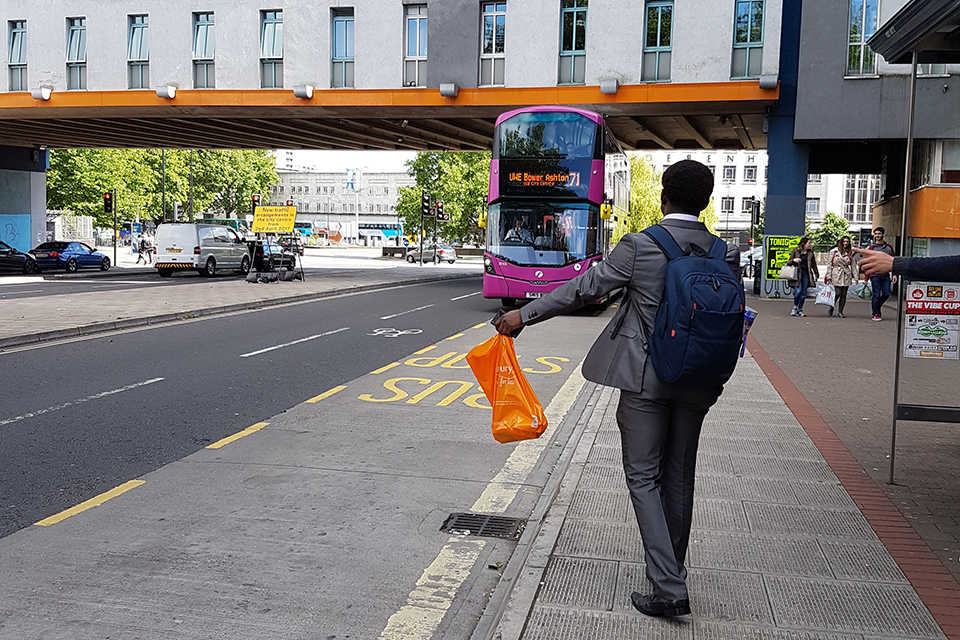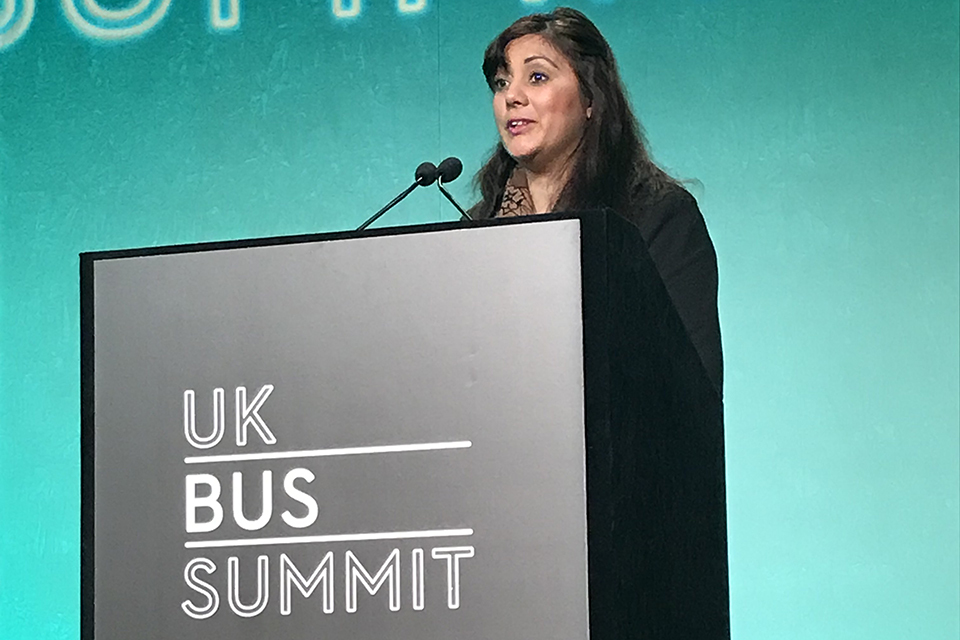Government funding for cleaner buses
Bus and Coach Minister Nusrat Ghani announces funding for 20 local authorities as part of the Clean Bus Technology Fund.

Opening remarks
Thank you David [Begg, Chair] for that welcome.
It’s a real pleasure to join you for today’s (8 February 2018) summit.
This is my first formal speech since joining the Department for Transport in the recent reshuffle, and I was delighted to take on responsibility for government bus and coach policy.

Bus and Coach Minister Nusrat Ghani speaking at the UK Bus Summit.
Importance of industry
I’m a huge advocate for buses.
Catering for over 5 billion passenger journeys a year.
That’s two thirds of all public transport trips.
Buses are the most effective and affordable way to keep busy towns and cities moving.
And we’re very fortunate to have such excellent coach services in this country too.
Providing a comfortable, reliable and great value alternative to long distance train and car travel.
Put simply, this industry is indispensable.
No other form of public transport offers anything like the benefits that you offer.
Whether it’s capacity, geographical coverage, ease of use, cost, efficiency – I could go on.
For me most importantly, buses provide a unique answer to most of the local transport challenges that we face.
Yet so fundamental are they to British life that they’re often taken for granted.
That’s something that I want to change, with your support.
I want to champion buses and coaches.
To shout about the benefits of bus travel.
How they bind our towns and cities together.
How they provide essential links for rural communities, such as the one I represent in Wealden, East Sussex.
And how they’ll become even more vital in years to come.
Congestion and air pollution
Of course, one of the biggest obstacles to growth is road congestion.
And that’s nothing new.
Buses have been hampered by congestion since the days of the horse-drawn omnibus.
But I want to use the Bus Services Act as a way of encouraging authorities and bus companies to make services more attractive, and create a shift away from car use.
I know it’s a big challenge.
But road transport is going to be revolutionised over the next 3 decades.
New vehicle technologies.
New infrastructure.
The phasing out of fossil fuels.
And digital communications transforming the way passengers plan and use transport….
All of which provide an unprecedented opportunity for buses.
We have to hammer home our message:
That rather than contributing to the problem of nose-to-tail traffic and harmful pollution.
Buses and coaches are a part of the solution.
You’ll certainly have the government’s support.
We have already committed £3.5 billion for measures to improve air quality.
Last year we published plans to tackle traffic pollution, and announced a £220 million Clean Air Fund in the Budget.
Later this year we’ll be unveiling our Clean Air Strategy.
And hosting an international zero-emission vehicle summit.
The opportunity here is to position the bus industry as a leader in environmentally friendly transport.
As a catalyst for greener, smarter travel.
And as the most practical answer to the long term mobility needs of our towns and cities.
Low emission buses
Britain is already a pioneer in low carbon buses.
And the industry can be proud of what it’s achieved in recent years.
We’ve got great companies like ADL, Wrightbus and Optare manufacturing green buses.
We have almost 6,000 low carbon buses in service.
The highest number of electric buses in Europe.
And we also have the largest hybrid fleet of over 3,000 vehicles.
And in 2015, our Low Emission Bus Scheme helped put more 300 green buses on roads across Britain.
And that was followed in November 2016 with a further £100 million investment.
We welcome further interest and participation in these schemes.
The sooner we get more low emission buses on the road, the faster we’ll reap the benefits.
So today I’m pleased to announce that we’ll be awarding nearly £40 million of that funding to 20 local authorities as part of the Clean Bus Technology Fund.
This will be used to retrofit buses with technology to reduce tailpipe emissions of nitrogen dioxide.
Originally we invited authorities to apply for a funding total of £30 million now and £10 million in 2 years’ time.
But we received a large number of strong applications for this round.
And we wanted to start realising the air quality benefits as quickly as possible.
So we’ve made the full amount – just under £40 million – available now to fund two-year projects.
It will enable older vehicles to meet the minimum standards in the Clean Air Zone Framework, particularly in areas exceeding statutory limits.
And I am going to announce the successful bidders:
West Yorkshire.
Bristol and Bath.
Gateshead.
Leeds City.
Transport for West Midlands.
Leicester City.
Oxford City.
Coventry.
Nottinghamshire.
Transport for Greater Manchester.
North Tyneside.
Nottingham City.
Transport for London.
Sheffield City.
Sefton MBC Air Quality.
Southampton City.
Derby.
Essex.
South Tyneside.
And finally, Newcastle City.
I’m grateful to all the bus companies who had a hand in the applications.
Ultimately, we see dedicated ultra low emission buses as the long-term answer - but retrofitting offers a very attractive alternative for now.
Not all local authorities were successful with their bids.
But there will be further opportunities for councils to receive money for retrofitting through the Clean Air Fund.
As local authorities prepare to set out their initial plans for reducing nitrogen dioxide concentrations by the end of March, retrofitting technology will help ensure that more buses help clean up the air in our cities.
And as we look to the future, technology will give us other opportunities to improve the efficiency of buses.
For example, if we know how much passenger demand there is for a particular route or service, we can look at providing the appropriate size of vehicle for the job…..
Not just cutting the number of empty seats.
But cutting costs and emissions too.
Bus Services Act
I’ve already mentioned the Bus Services Act, and how it’s designed to make bus services more attractive to the travelling public.
That’s something I will be focusing on in the months ahead.
New enhanced partnership powers will enable local authorities and bus operators to work together to improve services.
And new franchising powers, replacing the existing Quality Contract Scheme, will also improve the management of buses in the regions where they apply.
I’m keen to see the open data provisions in the act benefit passengers too.
One of the existing barriers to passenger growth is that it can be difficult to obtain information on bus fares, routes or times.
Where the information does exist – on the web, for example – it can be inconsistently presented, or be buried in unwieldy and hard-to-decipher timetables.
But by making data open and accessible, software firms can create apps that package and deliver the relevant information to smartphones at the click of an icon.
So the open data should make it easier for passengers to use the bus network.
We published guidance on implementing the measures in the Act last November.
And we’ll publish further regulations and guidance this year.
Conclusion
So – to sum up – I see the future as full of opportunity.
If buses are crucial to our transport system today….
Then as road transport is transformed over the coming decades….
They will become more important than ever.
And I’ll be doing everything I can to spread the message.
I’ll be getting around the industry over the next few months, and meeting as many of you as possible.
To hear your views on how we can best support growth.
But one thing is absolutely clear.
The key to success is partnership. Government and bus industry, local authorities and operators working together. For the benefit of the passenger, for the benefit of bus operators, and for the benefit of Great Britain.